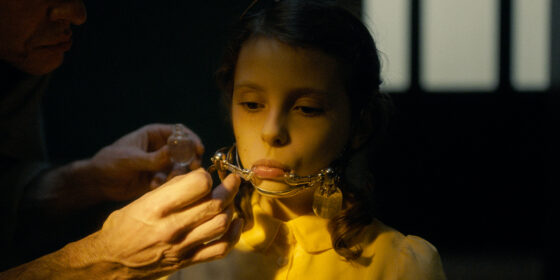TIFF 2021 | Earwig (Lucile Hadžihalilović, UK/France/Belgium)

By Madeleine Wall
In a large, gloomy house somewhere in Europe, sometime after a war, Albert (a brittle Paul Hilton) lives in isolation with his charge, ten-year-old Mia (Romane Hemelaers). Mia does not speak, and Albert’s main communication with the outside world is from sporadic telephone calls, asking about the state of his ward. Mia requires more care than the average child, and Albert spends his time creating, and replacing, her teeth, which are made of ice. They live in this Sisphyean routine until Albert is told that they’ll be leaving soon, and he has to prepare her, and himself, for the world.
Albert’s purpose is tied to this child, and, via the ritual of her melting teeth, she is dependent on him. His care of Mia is meticulous, but as her childhood ends, we see that the isolation of their relationship comes from Albert protecting himself—from the outside, from his past, from what he can do. It is Albert who keeps the two of them in their dark, Hammershoi-esque house, refusing to open the windows. His life is this caretaking, and as he tries to prepare Mia for the realm of the living, he has an encounter with local waitress Celeste (Romola Garai), leading to horrific violence whose consequences he cannot escape.
As in her previous features Evolution and Innocence, Hadžihalilović structures her new film around routines of care rather than plot, exploring how misplaced parental energies shape the lives of children. In Earwig, loosely based on a novel by Brian Catling, the menace bubbling beneath those movies’ surfaces is made more explicit, a striking shift into more material concerns. Like Albert, Hadžihalilovic is meticulous, with as much attention given to the light in an empty room and the languorous pacing as to the elaborate contraption for creating Mia’s teeth, an object that is both fragile and sharp. It’s easy enough to describe her film as a kind of fairy tale, but here the focus is on Albert. We tell fairy tales to children to teach them about things to come, but more often it is the teller who is revealing themselves.
Madeleine Wall

